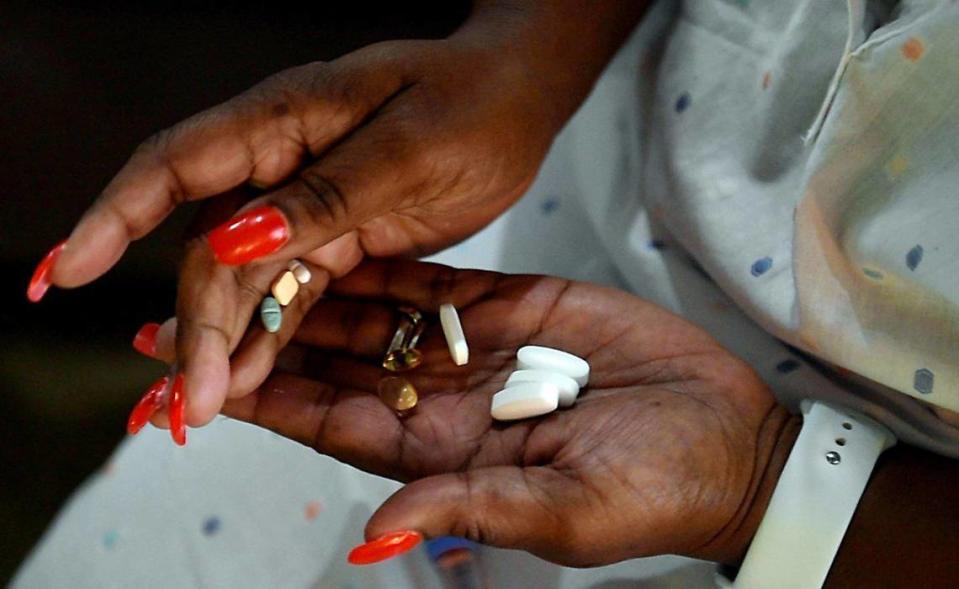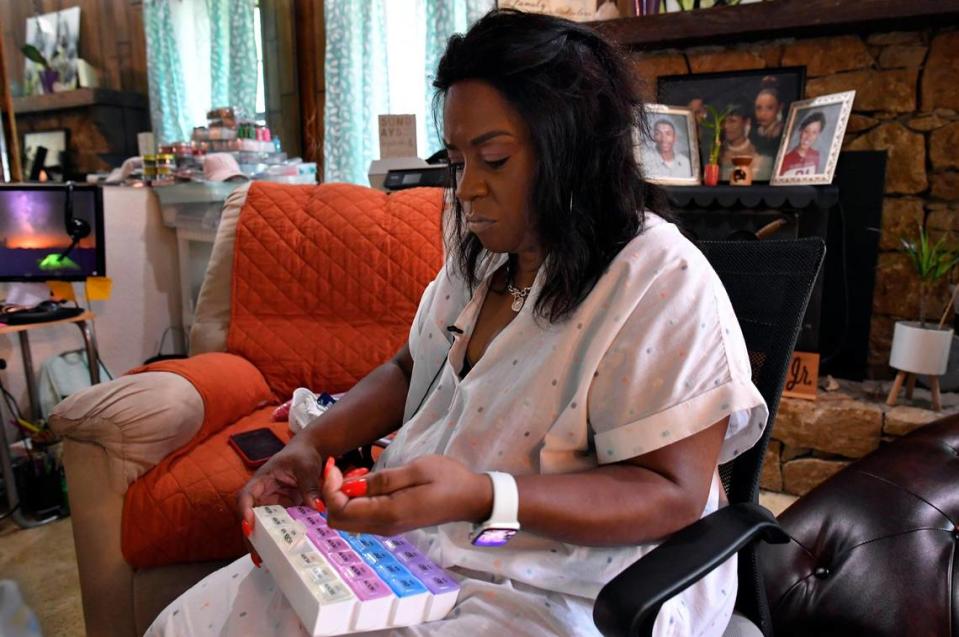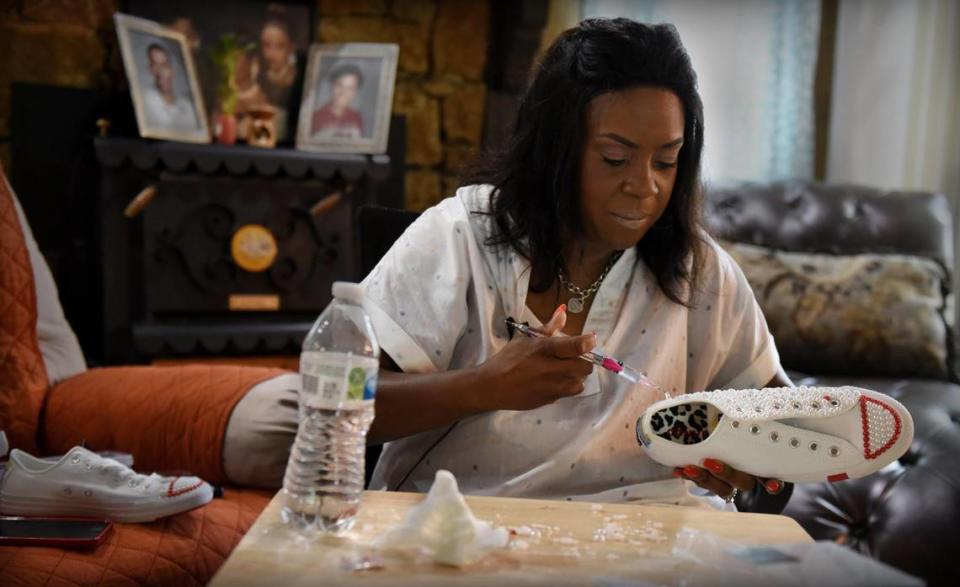Kansas City woman thought her COVID was mild. Her health, and finances, still suffer
This is what 53-year-old Shantell Williams remembers about the night she died in an ICU bed.
She was hooked up to a lot of machines because doctors at Truman Medical Centers/University Health were trying to figure out what was going haywire with her heart. A nurse had just started her on a new round of fluids.
Then things got scary. But Williams didn’t know it.
She only remembers a doctor coming into her room “and kinda hollering at me, my name, and I remember looking at him but I don’t remember anything else after that.”
“We lost you,” doctors told her later. “We lost you for a few minutes.”
The Kansas City preacher’s wife knocked on heaven’s door because COVID-19, which she had recovered from, isn’t done with her. She is one of America’s long-haul COVID victims who suffer health problems weeks, even months after their initial diagnosis.
They suffer all manner of problems — brain fog, shortness of breath, pain in their chests and joints, persistent insomnia, anxiety, depression and the kind of debilitating fatigue that slows their daily lives.
Williams’ souvenirs of the pandemic? A huge plastic pill case that rattles like a maraca with nine new medications she has to take for her heart and $80,000 in medical bills that she’s paying off in installments.
Of 2 million COVID-19 patients, 23.2% — more than 450,000 people — sought treatment for at least one medical problem a month or more after their initial diagnosis, recent research by the nonprofit FAIR Health found.
Anywhere from 10% to 30% of people who have COVID-19 will continue to have symptoms beyond 90 days, “and some of these can be physically and mentally disabling,” said Dr. Mark Steele, Truman’s chief medical officer.
“I think another issue is that, sometimes when people like this go to seek help, the message is it’s all in their mind. That’s not how we approach it. These individuals have real ailments.”
They have real, and mounting, medical bills too. At the beginning of the pandemic, government and private programs protected COVID patients from high out-of-pocket medical expenses, but many of those protections have either expired or been dropped by insurance companies that don’t waive co-pays anymore. Debt for people suffering post-COVID problems is piling up.
In recent months Truman and the University of Kansas Health System created programs to treat long-haulers like Williams, putting pulmonologists, cardiologists, neurologists and other specialists within easy reach. Both programs are available to anyone, including people who aren’t patients there.
Truman’s Center for COVID Recovery, the newest of the two, has fielded more than 150 referrals to its program; more than half of the people referred themselves, said Steele.
So far the KU clinic has seen nearly 300 long-haul patients, said Dr. Branden Comfort, an internal medicine physician with the KU health system.
“We’re open to anybody at this point, so we’ve been having a lot of patients here in the Kansas City metro area and we’ve been getting more and more, mostly from across the state of Kansas,” including rural communities, said Comfort.
Long-haul clinics across the country are also seeing “a surprising number of younger patients, patients in their 20s, 30s and 40s. Many of them actually had a mild acute phase of the illness. They didn’t require hospitalization or need ICU-level care,” said Comfort. But many long-haul patients are over 50, he said.
The patients get stressed and frustrated because their recovery is slow and there are no clear answers about why they are sick again, or how long these new problems will last, Comfort said.
The Centers for Disease Control and Prevention and researchers around the world are trying to figure out who gets these lingering effects and why.
“We don’t have some magic solution to help treat these patients and so it’s really like just a long, slow recovery and it really wears on them, mentally and emotionally,” said Comfort. “It’s a really tough medical condition.”

First COVID, then heart problems
This wasn’t how this past year was supposed to go for Williams, who lives in a south Kansas City home she shares with her husband, mother and daughter. She spends hours in the living room where she and her husband have his-and-hers recliners. Her comfy chair sits in front of the fireplace, decorated with family photos and a sign stating one of the rules of the house: Never Give Up.
In March 2020, just as the pandemic shut everything down, she had minimally invasive weight loss surgery at Truman that helped her lose 125 pounds and dump all the pills she was taking for diabetes, high blood pressure and acid reflux. She was down to just a vitamin and a calcium pill when she caught COVID.
She tested positive in December. Her symptoms were mild and she only missed four hours of work to receive treatment, an infusion of the monoclonal antibody bamlanivimab.
She was done with COVID.
Or so she thought.
A month later, she put in a full day’s work at the small work table next to the sofa in her living room. She’s a transit company dispatcher and works out of her home.
That Monday morning, her heart hurt like it was trying to play catch-up with the rest of her body, she described. She worked despite the pain because she didn’t want someone else to get stuck with her responsibilities.
After work that day, doctors at Truman could find nothing wrong, she said, and she went home.
That was the day before she almost died.
“In a matter of 24 hours, everything in my life changed,” said Williams.

COVID aftermath: Heart inflammation
The next morning her heart still hurt and her head pounded. She was so weak she had to be carried to the bathroom.
“I was delirious and my neck hurt very bad,” said Williams.
In Truman’s emergency room her blood pressure began “dropping and dropping and dropping and dropping,” she said. “When the doctor comes in and tells you it doesn’t look good … I got scared.”
She said doctors thought she had a blood clot because COVID-19 is known to cause them. But they couldn’t find one. Frustrated, one of her doctors said, “It’s got to be here, the blood clot has to be here somewhere.”
Later that night, her heart stopped beating.
She stayed in ICU more than a week while cardiologists and infectious disease specialists tried to figure out what was happening.
Finally, they diagnosed her with pericarditis of the heart — inflammation of the sac-like pericardium surrounding the heart — caused by COVID, she said. It can take weeks or months to recover.
Foggy brain and fatigue persist
Long-haul patients swap their nightmare stories in private Facebook support groups:
“I experienced indents (deep dents) in my fingernails … as my nails grew out after having COVID.”
“Six months later the worst upper gastric pain.”
“Having trouble swallowing now and at the GI Dr as we speak. It’s been a long road of heck and I’m really struggling with this.”
“My legs are full of water taking 40 mg of Lasix.. it’s not helping... Going into the hospital to do IV Lasix.”
Williams has her own list of COVID-caused chronic problems.
“Sweats. The heart problem, sometimes foggy brain,” she said. “Sometimes I’m at work and I have to think about what I’m doing next or what I need to do, where usually (snaps her fingers) I was on point.”
“And I get fatigued. I get fatigued a lot. It’s been kind of bad lately. I can go to sleep and it’s like I haven’t had any sleep at all.”
Brain fog is a common long-haul symptom.
“One patient, for example,that ran his own company had a lot of brain fog trouble … was having significant difficulty juggling tasks, whereas before he was able to manage those completely,” said Comfort. “I’ve had people who work at call centers or nurses, had several nurses who just have some difficulty being at the top of their game, so to speak, afterwards.”
Profound exhaustion after simple tasks like working around the house is also common, he said. Patients who were fit and exercised regularly before they had COVID are too tired to be as active now.
“Then other chronic illnesses are starting to develop like weight gain and all the other issues that can come along with that, with blood pressure and blood sugar problems,” Comfort said.
Doctors are also seeing many patients struggle with ongoing shortness of breath and coughing, keeping Comfort’s pulmonary colleagues busy.
Some patients are also failing standard dementia screening tests.
Depression is common.
“That’s a big part of this,” Comfort said. “People are feeling a big sense of loss with this, loss of their energy, loss of being able to do the things they were able to do before. And then there’s a lot of unknowns.”
It’s too early to tell how long these problems will last, Comfort said, but “the pattern we’ve been seeing is that people have been improving over time. It seems to be taking many months. There are a few patients who are coming up close to that one-year mark.”
What will the government pay?
Because of her lingering problems, Williams visits doctors at Truman Medical Center at least two or three times a month.
The new heart issues “cost me a whole lot of money. Especially the medicine,” which her employer-sponsored health insurance doesn’t cover entirely. She pays about $200 a month for these new medications.
The $80,000 bill she’s making payments on is her share of the cost of the ICU stay at Truman when doctors discovered the heart condition.
Uninsured Americans don’t have to pay for COVID-19 testing, treatment or vaccines because the government reimburses health care providers.
But Coronavirus Aid, Relief and Economic Security (CARES) Act protections didn’t cover everyone, and out-of-pocket expenses have become common for many COVID patients, whether or not they have private health insurance.
Medicare patients who don’t have supplemental insurance, in particular, have faced high out-of-pocket costs. Cost-sharing for Medicaid patients is usually minimal.
“What was really different about COVID is our federal government stepped in and said we’re going to provide coverage for those patients that are unable to get insurance as long as they reside in the United States, regardless of their immigration status,” said KU’s Colette Lasack, vice president who oversees medical and health system billing.
“That is something in my long tenure in this business that had never been done before.”
But the medical bills for long-haul patients are a different, more complicated story. Standard health insurance policies cover post-COVID symptoms as they would any other illnesses, said Lasack.
But for the non-insured, it’s often unclear whether the government considers later medical problems COVID-related.
Under current guidelines, the government will cover only those costs associated with the primary diagnosis of COVID-19, Lasack said.
“And in these long-haulers, that is not their primary diagnosis many times, because now we are treating long-residing symptoms. So that’s what’s difficult as we’re starting to treat these patients,” said Lasack.
She said the health system’s financial counselors help patients get coverage “whenever they can because that helps take away a lot of that anxiety of how am I going to pay for this?”
She advises patients who have insurance to educate themselves about their deductibles, co-pays and in-network health care providers.
“People tend to know more about their car insurance than they do their health insurance … because it’s complicated,” Lasack said. “So get educated. You’re paying for that policy. And that’s really maximizing your policy because you don’t want to get hit by an out-of-network penalty.”
Across the country, people hit with huge COVID medical bills have turned to crowdsourcing for help, charged them to their credit cards, and sometimes are just ignoring them, leading some financial experts to predict a wave of future bankruptcies.
“We want you to call us. If you get a statement from us, call us,” said Lasack. “Don’t be embarrassed. Don’t be frustrated. Find out what’s available. Every hospital in the nation has financial assistance for those unable to afford their care.
“There’s probably more options out there for patients to secure coverage than what they really understand or know.”

COVID changed her heart
Some days, when Williams is sitting in her chair in the living room and her husband is sitting in his chair across from her, she tells him, “well, my heart’s hurting.”
“But I keep moving,” she said. “I keep pushing. I’m not going to let it lay me down. It’s going to have to literally lay me down for me to stop moving.”
Before COVID and its long reach slowed her, Williams bustled through life, active in her missionary church on a local and state level, helping to care for her elderly mother in her home and taking food to local homeless camps.
During the pandemic she and her husband made sure that church families hit by COVID had enough food.
She had to shift into a slower gear after COVID damaged her heart. She can’t walk three to five miles a day anymore. She’s found a hobby she can do sitting down, gluing faux pearls and glitter to Converse athletic shoes and selling them as fast as she can decorate them.
“I was moving way too fast,” said Williams. “I look at life differently now. I was a person that was always on the go. I didn’t get rest. I try to get rest now. I try to take things slow.
“There are some things I’m starting to contemplate about my future. … It’s changed. Not only did it change my heart, it changed my heart, if you know what I mean.”
KC long-haul clinics
The University of Kansas Health System: 913-588-1227. kansashealthsystem.com/vaccine. You need a doctor’s referral and symptoms for more than 12 weeks.
Truman Medical Centers/University Health: 816-404-CARE (2273). trumed.org/covid-19/center-for-covid-recovery. It must be at least 90 days since you tested positive for COVID, and you need documentation of that test.

